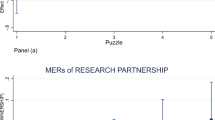Abstract
This contribution aims at using an Austrian approach of institutions to discuss specific institutional arrangements in the current working of science-industry relationships. By combining distinctive characteristics between Menger's and Hayek's research programs, we establish a typology of institutions that goes beyond the usual way to approach business institutions and allows us to identify transitory types of institutional arrangements called “innovative institutions”. We apply that Austrian approach of institutions and address its relevance to highlight some puzzling issues derived from empirical evidence. Then, innovative institutions reveal particularly suited to understand how public and private research work together in science-industry relationships.
Similar content being viewed by others
References
Amendola, M. and Gaffard, J. L. (1988) The Innovative Choice. Oxford: Basil Blackwell.
Arrow, K. (1962) EconomicWelfare and the Allocation of Resources for Invention. N.B.C.E.R, Princeton: Princeton University Press.
Callon, M. (1995) “Externalité et Coordination Marchande: Un Point de vue Sociologique.” CSIWorking Papers.
Cassier, M. (1995a) Les contrats de recherche entre l'université et l'industrie: l'émergence d'une nouvelle forme d'organisation industrielle. Thesis, Paris: Ecole des Mines de Paris.
Cassier, M. (1995b) “Les règles de 'bonne conduite' du projet BRIDGE Sur Les Lipases: appropriation et partage des connaissances technologiques dans un réseau coopératif.” Contribution to “Journées 1995 du CSI”, December.
Cassier, M. (1997) “Compromis institutionnels et hybridations entre recherche publique et recherche privée.” Revue d'Economie Industrielle, 79: 191–212.
Cole, A. (1968) “The Entrepreneur, Introductory Remarks.” American Economic Review: Paper and Proceedings, 58: 60–63.
Dasgupta, P. and David, P. (1994) “Toward a New Economics of Science.” Research Policy, 23: 487–521.
Diamond, A. M. (1996) “The Economics of Science.” Knowledge and Policy, 9: 6–49.
Flésia, E. (1996) “La création d'entreprises par les chercheurs publics.” Research note 4-1432, CNRS-LEST, Aix-en-Provence.
Foss, N. J. (1999) “The Use of Knowledge In Firms.” Journal of Institutional and Theoretical Economics, 155: 458–486.
Gambardella, A. (1995) Science and Innovation: The US Pharmaceutical Industry During the 1980s. Cambridge: Cambridge University Press.
Garrouste, P. (1994) “Carl Menger et Friedrich A. Hayek à propos des institutions: continuité et ruptures.” Revue d'Economie Politique, 104: 851–872.
Hayek, F. A. [1948 (1937)] “Economics and Knowledge,” In: Hayek, F. A. (Ed.) Individualism and Economic Order, pp. 33–54. Chicago: University of Chicago Press.
Hayek, F. A. [1948 (1945)] “The Use of Knowledge in Society.” In: Hayek, F. A. (Ed.) Individualism and Economic Order. pp. 519–530. Chicago: University of Chicago Press.
Hayek, F. A. (1967) Studies in Philosophy, Politics, and Economics. London: Routledge & Kegan Paul.
Hayek, F. A. (1978) “Competition as a Discovery Procedure,” In: Hayek, F. A. (Ed.) New Studies in Philosophy, Politics, Economics and the History of Ideas, pp. 179–190. Chicago: University of Chicago Press.
Joly, P. B., Lemarié, S., and Mangematin, V. (1998) “Coordination et incitations dans les contrats de recherche: le cas des accords public/privé.” Revue Economique, 49: 1129–1149.
Kreps, D. M. (1996) “Markets and Hierarchies and (Mathematical) Economic Theory.” Industrial and Corporate Change, 5: 561–595.
Langlois, R. N. (1986) “Rationality, Institutions and Explanations,” In: Langlois, R. N. (Ed.) Economics as a Process, Essays in the New Institutional Economics, pp. 225–255. Cambridge: Cambridge University Press.
Langlois, R. N. (1988) “Economic Change and the Boundaries of the Firm,” Journal of Institutional and Theoretical Economics, 144: 635–657.
Langlois, R. N. (1995) “Do Firms Plan?” Constitutional Political Economy, 6: 247–261.
Langlois, R. N. and Robertson, P. L. (1995) Firms, Markets and Economic Change: A Dynamic Theory of Business Institutions. London: Routledge.
Latour, B. (1989) La science en action. Paris: La découverte.
Lazear, E. P. (1996) Incentives in Basic Research. NBER Working Paper, N°5444, January.
Lazonick,W. (1991) Business Organization: The Myth of the Market Economy. Cambridge: Cambridge University Press.
Loasby, B. (1976) Choice, Complexity and Ignorance: An Enquiry into Economic Theory and the Practice of Decision Making. Cambridge: Cambridge University Press.
Lundvall, B. A. (1985) Product Innovation and User Producer Interaction. Aalborg: Aalborg University Press.
Lundvall, B. A. (1988) “Innovation as an Interactive Process: From User-Producer Interaction to the National System of Innovation,” In: Dosi, G. and Alii (Eds.) Technical Change and Economic Theory, pp. 349–369.London and New-York: Pinter Publishers.
Machlup, F. [1991 (1974)] “Friedrich von Hayek's Contribution to Economics,” In: Wood J. C. and Woods, R. N. (Eds.) Friedrich A. Hayek: Critical Assesments, vol. II, pp. 193–229. London: Routledge.
Menger, C. [1963 (1883)] Problems of Economics and Sociology. Urbana: University of Illinois Press.
Menger, C. [1995 (1892)] “On the Origin of Money,” In: Kirzner, I. M. (Ed.) Classics in Austrian Economics: A Sampling in the History of a Tradition, vol. I, pp. 91–108. London: William Pickering.
Mustar, P. (1991) “Processes of Integrating Science with the Market: The Creation of Technology-Based Businesses.” Contribution to the Conference “Management de la Technologie.” Paris, May.
Nelson, R. R. (1959) “The Simple Economics of Basic Scientific Research.” Journal of Political Economy, 67: 297–306.
Quéré, M. and Ravix, J. L. (1996) “Les relations recherche-industrie: Analyse des procédures d'accès à des activités nouvelles.” In: Ravix, J. L. (Ed.) Coopération entre les entreprises et organisation industrielle. Paris: CNRS-Editions.
Quéré, M. and Ravix, J. L. (1997a) “Academic Research and Entrepreneurship: How Public Researchers Organize the Science-Industry Relationship.” Contribution to the Conference. The Need for a New Economics of Science, University of Notre Dame, Indiana, March.
Quéré, M. and Ravix, J. L. (1997b) “Relations science-industrie et Institutions innovatrices.” Revue d'Economie Industrielle, 79: 213–232.
Quéré, M. and Ravix, J. L. (1999) “La relation science-industrie: économie de la science ou économie de l'innovation?” Contribution to the AFSE Conference on Innovation, Sophia-Antipolis, May.
Richardson, G. B. (1972) “The Organization of Industry.” Economic Journal, 82: 883–896.
Stephan, P. (1996) “The Economics of Science.” Journal of Economic Literature, 34: 1199–1235.
Williamson, O. E. (1975) Market and Hierarchies. New-York: The Free Press.
Williamson, O. E. (1985) The Economic Institutions of Capitalism: Firms, Markets, Relational Contracting. New-York: The Free Press.
Author information
Authors and Affiliations
Rights and permissions
About this article
Cite this article
Quéré, M., Ravix, JL. The Austrian Theory of Institutions Applied to Science-Industry Relationships: The Relevance of Innovative Institutions. The Review of Austrian Economics 16, 271–284 (2003). https://doi.org/10.1023/A:1024501109450
Issue Date:
DOI: https://doi.org/10.1023/A:1024501109450




